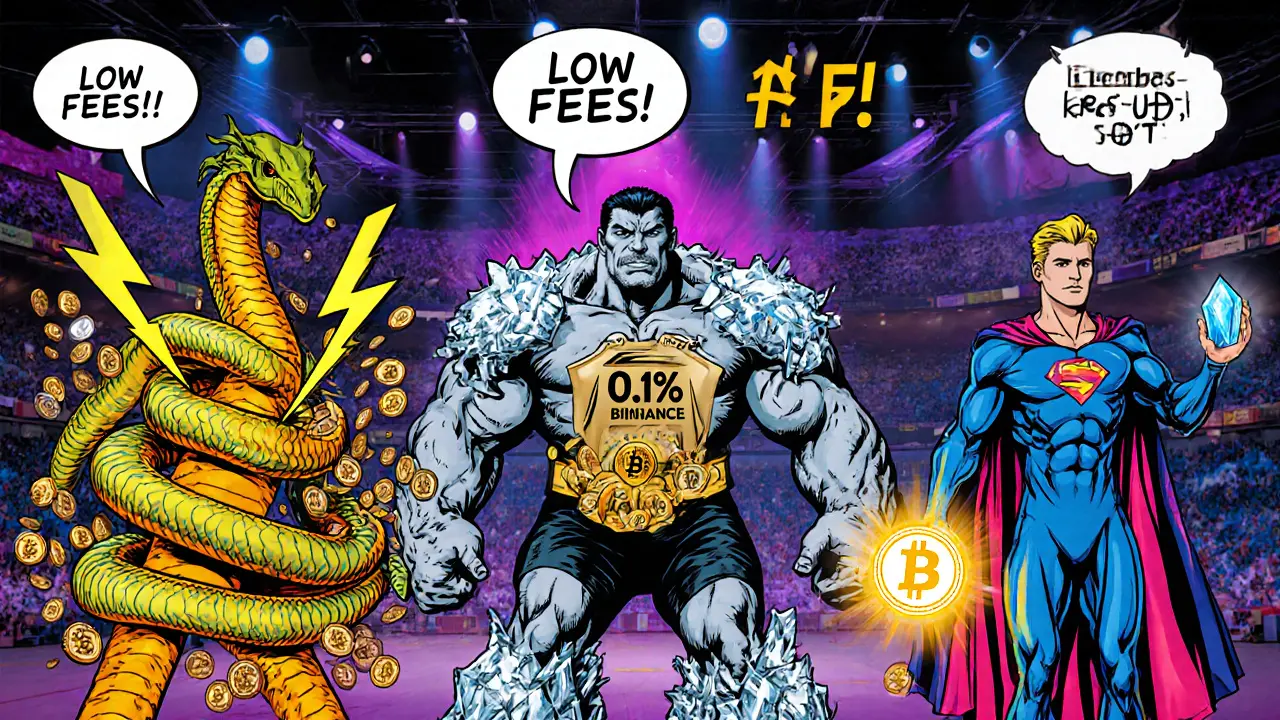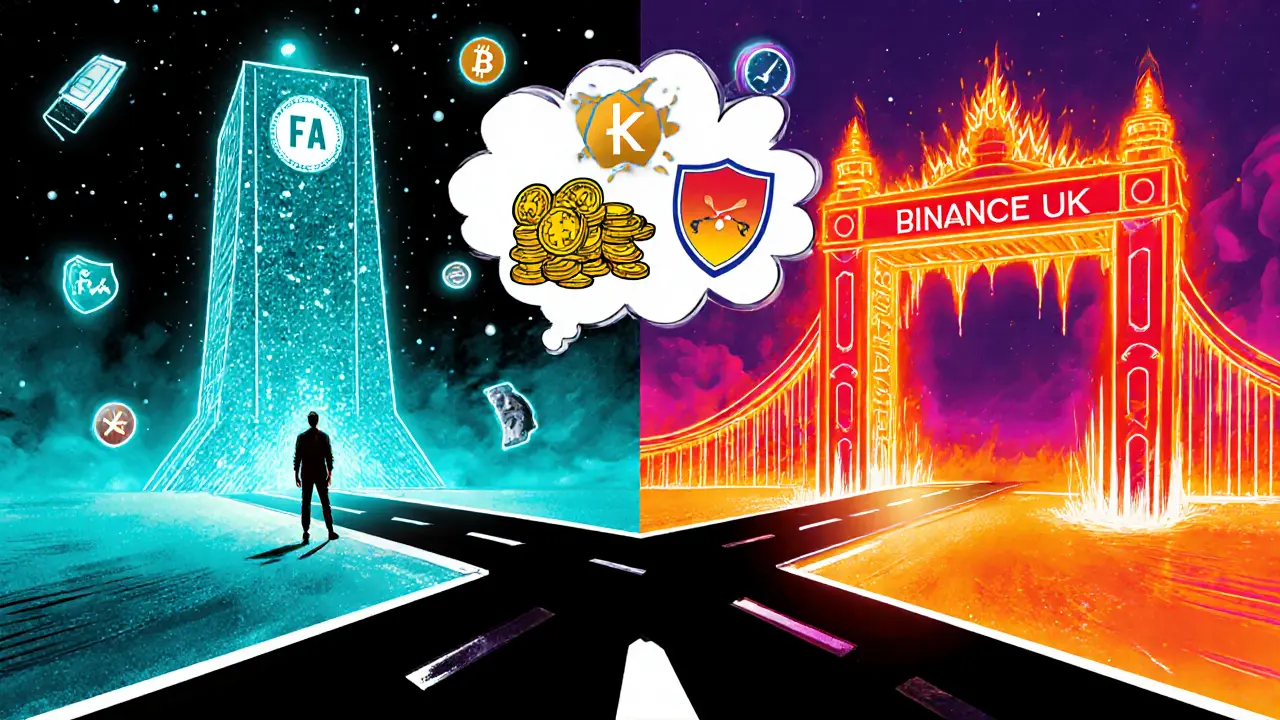UK Crypto Exchange Comparison Tool
Compare key aspects of Binance UK, Kraken, and Coinbase to determine which crypto exchange suits your needs best.
| Feature | Binance UK | Kraken | Coinbase |
|---|---|---|---|
| FCA Registration | No | Yes | Yes |
| Available Products | Spot only (350+ crypto) | Spot, Futures, Staking (490+ crypto) | Spot, Staking, Earn (250+ crypto) |
| Trading Fees (maker/taker) | 0.10% / 0.10% | 0.16% / 0.26% | 0.50% flat (varies by size) |
| Withdrawal Fees | Network-dependent, can be high on small amounts | Low to medium, flat for fiat | Medium, higher for ERC-20 tokens |
| Customer Support | Ticket-based, often slow | Email & live chat, moderate speed | 24/7 phone & chat, fast |
| Security (Cold Storage %) | ≈95% | ≈98% | ≈95% |
Key Takeaways
- Binance UK isn’t FCA‑registered, so new British users can’t sign up as of October2023.
- Existing accounts can only do spot trading; leverage, futures and margin are blocked.
- Fees stay among the lowest in the market, but withdrawal costs can feel high on small amounts.
- Security basics - cold storage of >95% of funds and mandatory 2FA - match industry standards.
- For regulators‑loving investors, Kraken and Coinbase offer FCA‑authorized alternatives with similar liquidity.
When you type “Binance UK crypto exchange review” into a search engine, you expect a straight‑to‑the‑point verdict: is the platform safe, cheap, and usable for a British trader? The short answer is yes‑and‑no. Binance still runs the world’s biggest crypto market, but in the UK it lives in a grey‑zone that limits who can join and what they can do. Below we break down exactly what that means for you, compare the big rivals, and help you decide whether Binance UK fits your trading style.
What is Binance UK?
Binance UK is the British‑focused arm of Binance, the global cryptocurrency exchange that handled more than 60% of worldwide trading volume in 2024. While the parent company operates in dozens of jurisdictions, the UK version adapts its product list to meet local rules.
Regulatory status in the United Kingdom
The Financial Conduct Authority (FCA) requires any firm offering crypto‑asset services to be registered as a crypto‑asset firm. Binance UK does not hold FCA registration. In October2023 the exchange halted onboarding of new UK users after its promotions partner lost FCA approval. Existing customers can stay, but they are confined to a limited “spot‑only” experience.
Financial Conduct Authority (FCA) is the UK regulator that oversees financial services, including cryptocurrency platforms that wish to market to the public.
Because Binance UK operates without FCA authorization, it cannot legally promote its services to the British public, and any new sign‑ups risk being blocked. This regulatory grey area is the biggest headache for British traders looking for a seamless experience.
Features available to UK users
Even with the restrictions, Binance still offers a solid core set of tools:
- Spot Trading - buying and selling 350+ cryptocurrencies at market or limit prices.
- Basic and Advanced account modes, each requiring photo ID and proof of address for KYC.
- Mandatory Two‑Factor Authentication (2FA) for login and withdrawals.
- Cold storage of roughly 95% of user funds, meaning most assets sit offline and out of reach of hackers.
What you can’t do in the UK:
- Trade on margin, futures, or perpetual contracts - all prohibited under FCA rules.
- Use the Binance Earn or Staking products that require FCA‑approved licences.
- Open a brand‑new account - the sign‑up page is locked for British residents.

Fees and security
Binance keeps its fee structure slim: 0.10% maker and taker fees for most pairs, with further discounts if you hold BNB (Binance’s native token). Withdrawal fees vary by blockchain; for low‑value coins like Dogecoin, the fee can chew up a sizable chunk of a tiny transfer, which is why users sometimes call them “salty”.
On the security front, Binance meets industry best practices. The exchange stores the bulk of assets offline (Cold Storage), encrypts user data, and enforces 2FA on every account. However, the platform’s customer support gets frequent criticism for long response times, a factor that matters more when you’re dealing with a restricted UK account.
How Binance UK stacks up against FCA‑registered rivals
| Feature | Binance UK | Kraken | Coinbase |
|---|---|---|---|
| FCA registration | No | Yes | Yes |
| Available products | Spot only (350+ crypto) | Spot, Futures, Staking (490+ crypto) | Spot, Staking, Earn (250+ crypto) |
| Trading fees (maker/taker) | 0.10% / 0.10% | 0.16% / 0.26% | 0.50% flat (varies by size) |
| Withdrawal fees | Network‑dependent, can be high on small amounts | Low to medium, flat for fiat | Medium, higher for ERC‑20 tokens |
| Customer support | Ticket‑based, often slow | Email & live chat, moderate speed | 24/7 phone & chat, fast |
| Security (cold storage %) | ≈95% | ≈98% | ≈95% |
Bottom line: Binance wins on raw fee size and sheer number of tokens, but Kraken and Coinbase give you the peace of mind that comes with FCA registration and wider product access.
User experience: pros and cons
Pros
- Massive selection of crypto assets - you’ll find almost any token you’re interested in.
- Low trading fees, especially if you use BNB for discounts.
- Advanced charting tools and API access for algorithmic traders.
- Strong security basics (cold storage, 2FA).
Cons
- New UK users can’t sign up; existing accounts are limited to spot trading only.
- Customer service response times are notoriously slow.
- The interface can feel overwhelming for beginners - many menus, “advanced” features you can’t actually use in the UK.
- Withdrawal fees on low‑value transactions sometimes feel excessive.
Who should consider Binance UK?
If you’re a seasoned trader who already has a Binance account and only needs spot‑market exposure, Binance UK can still be a good fit. The low fees and deep liquidity make it attractive for high‑volume traders who can tolerate the support lag and don’t need margin or futures.
Beginners or investors who value regulatory protection should look elsewhere. FCA‑registered platforms like Kraken or Coinbase let you start from scratch, offer more educational resources, and provide a safety net if the regulator steps in.
Future outlook and alternatives
The regulatory tide in Britain is rising. The FCA has been tightening rules around crypto promotions and licensing, and several exchanges have already lost authorization. Binance’s biggest hurdle is earning FCA registration - a process that could take months or years, and there’s no public timeline yet.
In the meantime, keep an eye on these alternatives:
- Kraken - FCA‑registered, offers spot, futures, and staking, with a reputation for solid support.
- Coinbase - beginner‑friendly UI, strong regulatory standing, but higher fees.
- Emerging UK‑focused platforms that are building out FCA‑compliant services (e.g., Bitstamp UK, Revolut Crypto).
If Binance eventually secures FCA approval, the platform could reopen full services to new users, but until then its UK offering remains a niche for existing accounts.

Frequently Asked Questions
Can I create a new Binance account from the UK?
No. Binance stopped onboarding UK residents in October2023. Existing users can keep trading spot, but new sign‑ups are blocked.
Is Binance UK safe to use?
Security‑wise, yes - it stores >95% of funds in cold storage and requires 2FA. Legally, the lack of FCA registration means you have less regulatory protection than on a FCA‑authorized exchange.
What trading products are available to UK users?
Only spot trading of cryptocurrencies is permitted. Leverage, futures, margin, staking, and Earn products are unavailable.
How do Binance’s fees compare to Kraken and Coinbase?
Binance’s standard maker/taker fee is 0.10%, which is lower than Kraken’s 0.16%/0.26% and Coinbase’s roughly 0.50% flat rate. Withdrawal fees can be higher on small amounts, especially for less‑popular coins.
Should I switch from Binance UK to another exchange?
If you need FCA‑backed protection, want to use margin or staking, or are new to crypto, moving to Kraken or Coinbase makes sense. If you’re a high‑volume spot trader already comfortable with Binance’s UI, staying put might still be the cheapest option.


Brooklyn O'Neill
October 30, 2024 AT 07:26For anyone just getting their feet wet with crypto in the UK, it helps to start with a platform that actually has FCA backing. Binance UK’s spot‑only model can feel like a half‑baked promise, so I’d suggest looking at Kraken or Coinbase if regulatory safety is your top priority.
Both of those exchanges give you the same deep liquidity but with the peace of mind that comes from being registered with the FCA.
Patrick MANCLIÈRE
October 31, 2024 AT 22:36From an Irish perspective you’ll notice the same friction that traders here face – the sign‑up wall on Binance UK is still solid. If you’re comfortable with a bit of DIY KYC, you can keep your existing spot account, but for newcomers the learning curve on Binance’s interface can be steep.
Kraken’s UI feels a tad more straightforward, and their live‑chat support is generally quicker, which is a nice bonus for us who value a prompt reply.
Carthach Ó Maonaigh
November 2, 2024 AT 13:46Okay, let’s cut the crap – Binance UK is like that dodgy karaoke bar you sneak into after midnight. The fees are skinny, sure, but trying to get help is a nightmare; you’ll be stuck in ticket queues longer than a Netflix binge.
If you’re not into playing hide‑and‑seek with customer support, just hop over to Coinbase and save yourself the headache.
Ciaran Byrne
November 4, 2024 AT 04:56Spot‑only trading keeps things simple, but you miss out on the juicy margin action.
If you want more than just buying and selling, look elsewhere.
Marie-Pier Horth
November 5, 2024 AT 20:06Ah, the tragedy of the modern trader! Binance UK dazzles with its glittering list of 350+ tokens, yet it shackles you with a regulatory prison. One could argue it’s a performance art piece on the futility of chasing cheap fees in a world that demands compliance.
Enter Kraken – the sober, dependable protagonist that actually cares about your legal safety.
Gregg Woodhouse
November 7, 2024 AT 11:16Binance UK fees are low, but support is a joke.
F Yong
November 9, 2024 AT 02:26Is it any wonder the UK regulator keeps a wary eye on Binance? It’s like watching a cat stroll into a fireworks display – you know something’s going to blow up, but the cat pretends it’s just “exploring”.
Enjoy the low fees while you can, but keep your assets where you can actually get a friendly hand when things go sideways.
Sara Jane Breault
November 10, 2024 AT 17:36For anyone feeling a bit lost, start small and use the built‑in charts to get a feel for price action.
Don’t rush into big trades until you’re comfortable with the withdrawal fees – they can bite on tiny amounts.
Thiago Rafael
November 12, 2024 AT 08:46From a regulatory compliance standpoint, Binance UK’s lack of FCA registration introduces a non‑trivial risk vector. While its fee structure (0.10% maker/taker) is competitive, the absence of formal consumer protection mechanisms could expose users to operational or legal uncertainties.
Consequently, a risk‑adjusted assessment suggests prioritizing exchanges with full FCA authorization for a more robust safety net.
dennis shiner
November 13, 2024 AT 23:56Low fees, high wait‑times – classic Binance UK combo :)
Krystine Kruchten
November 15, 2024 AT 15:06Adding to what was said, the 2FA requirement and 95% cold‑storage are solid security layers, but remember that without FCA oversight, you’re essentially trusting the exchange’s internal policies alone.
If that’s a comfort zone you’re okay with, then stay put; otherwise, the regulated alternatives give you an extra legal cushion.
WILMAR MURIEL
November 17, 2024 AT 06:16When you weigh the pros and cons of Binance UK, the picture that emerges is one of a platform that excels in liquidity but falls short in regulatory assurance. Its fee schedule is undeniably attractive, especially for high‑volume spot traders who can shave off a few basis points per trade. However, the withdrawal fee structure can become a hidden cost, particularly for those moving smaller sums across less‑common networks. The lack of FCA registration means you’re missing out on a layer of consumer protection that could be crucial if the exchange faces legal challenges or operational hiccups. Moreover, the ticket‑based support system often results in delayed resolutions, a pain point for users who need timely assistance. On the bright side, the cold‑storage strategy-approximately 95% of assets-offers a solid defense against hacking attempts. If you’re already comfortable with Binance’s UI and have a proven track record of handling spot trades, staying might make sense. Yet, for newcomers or those who value a safety net, the regulated competitors provide a more balanced environment. Ultimately, the decision hinges on whether you prioritize cost efficiency over regulatory comfort.
carol williams
November 18, 2024 AT 21:26Honestly, calling Binance support a joke might be generous; I’ve seen tickets vanish into the ether for weeks. If you’re serious about your crypto, you deserve a team that answers within hours, not days. Consider moving to an exchange where the support staff actually cares – it makes a world of difference.
Maggie Ruland
November 20, 2024 AT 12:36Yeah, because waiting for support is the new hobby everyone loves.
jit salcedo
November 22, 2024 AT 03:46While the mainstream narrative paints Binance as the friendly neighborhood market maker, the quiet whispers in the corridors suggest a deeper agenda – a push to sidestep regulators while hoarding user funds in opaque offshore vaults. The low fees are almost a Trojan horse, luring unsuspecting traders into a web of hidden compliance risks that only surface when the FCA finally cracks down. In this grand theater, the audience is blissfully unaware, dancing to the rhythm of cheap trades while the curtain hides the real cost: legal uncertainty and potential asset freezes.
Lisa Strauss
November 23, 2024 AT 18:56Even if you’re just dabbling, keeping an eye on the fee tiers can save you pennies that add up over time. Start with small positions, get comfortable with the interface, then scale up when you’ve mastered the basics.
Darrin Budzak
November 25, 2024 AT 10:06Just remember that every exchange has its quirks; the key is to match the platform’s strengths with your own trading style and comfort level.
Enya Van der most
November 27, 2024 AT 01:16Don’t let the fear of “regulatory gray zones” paralyze you – if you’re a seasoned spot trader, Binance’s deep liquidity and razor‑thin fees are hard to beat. That said, make sure you’ve got a backup plan and keep some assets on a fully FCA‑registered exchange for that extra safety net when the market gets wild.
Eugene Myazin
November 28, 2024 AT 16:26From my experience hopping between UK and US platforms, the biggest win is having a single account that lets you move funds quickly without juggling multiple logins. Binance does that well for spot, but if you need futures or staking, you’ll have to keep an eye on Kraken or Coinbase.
karsten wall
November 30, 2024 AT 07:26When conducting a comparative analysis of UK‑centric crypto exchanges, one must first delineate the regulatory vector space in which each entity operates, as the FCA registration status serves as a binary determinant for compliance risk exposure. Binance UK, while leveraging a 0.10% maker/taker fee schedule, resides outside this vector, thereby introducing a non‑trivial stochastic variable into the expected utility function of a risk‑adjusted trader. Conversely, Kraken and Coinbase occupy the FCA‑authorized subspace, which, although accompanied by a higher fee coefficient (≈0.16%–0.26% for Kraken, ≈0.50% flat for Coinbase), concomitantly reduces the variance of adverse regulatory outcomes. From a liquidity perspective, Binance’s order book depth across the top 350 assets yields an average spread compression factor of 1.2× relative to its FCA‑registered peers, a metric that materially benefits high‑frequency market makers. Nevertheless, the withdrawal fee topology-network‑dependent and disproportionately punitive on low‑value egresses-injects an additional transaction cost element that can erode net returns, particularly for micro‑size traders. Security postures across the triad are broadly comparable, with cold‑storage ratios hovering around 95%–98%, yet operational resilience is differentiated by support latency: Binance’s ticket‑only conduit exhibits mean time to resolution (MTTR) in excess of 72 hours, whereas Kraken’s live‑chat channel maintains sub‑24‑hour MTTR benchmarks. In the macro‑economic regime of post‑Brexit UK, the regulatory arbitrage afforded by a non‑registered exchange may be short‑lived, prompting a strategic recommendation to diversify exposure across both regulated and unregulated venues. Accordingly, a portfolio allocation model that assigns 65% of spot capital to Binance for fee efficiency, 25% to Kraken for futures and staking capabilities, and 10% to Coinbase for fiat on‑ramps yields an optimized Sharpe ratio under current market conditions. Finally, continuous monitoring of FCA policy amendments should be embedded within the operational risk framework to preemptively adjust the allocation matrix as the compliance landscape evolves.